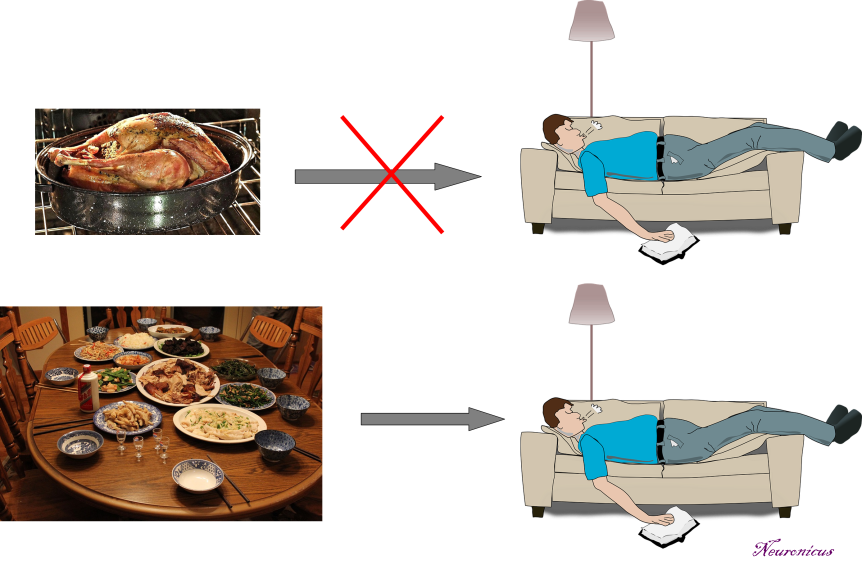 The paper I feature today is not an experimental study, but an editorial written as a short review (5 pages). A not very good one, I’m afraid.
The paper I feature today is not an experimental study, but an editorial written as a short review (5 pages). A not very good one, I’m afraid.
Neurochemical imbalances are to be found in virtual any brain disorder. Probably the most known is the serotonin depletion associated to depression, which is the main reason why SSRIs (selective serotonin reuptake inhibitors) are so widely prescribed for the disorder. With the caveats that serotonin is but one player, that it has many receptors involved in different aspects of the disease and “depression” is an umbrella term for a host of behaviors, this editorial focuses on non-pharmacological ways to address the depletion of serotonin. Noble goal, poor execution.
In a nutshell, Young (2007) argues that there are 4 ways to increase serotonin availability in the brain:
1) effortful focusing on positive things, either via psychotherapy, talk, social interactions, mediation or just mental exercises to consciously improve mood. I’m sure that the thought of trying to focus on the positive thoughts never crossed the minds of depressed people! Of course that this is how healthy people regulate their moods, everybody is sad or suffers loss at some point in their life and a lot of people snap out of it by engaging in those suggested behaviors, but the trouble with depression is that it persists despite efforts to be positive. The author should know that crying “Cheer up!” to a depressed person never works, but chances are they would feel even more alienated because they’ve tried that already!
2) exposure to bright light (3000 lux). No contention here. Light therapy is successful in treating seasonal depression. We should all get more light.
3) exercise. It’s unclear which kind, aerobic or to fatigue, but probably either would work.
4) eating tryptophan-rich foods (like meat, cheeses or eggs). Why tryptophan? Because the brain can make serotonin out of tryptophan, but serotonin itself is too big of a molecule to enter the brain (i.e. doesn’t cross the brain blood barrier). But the author admits that “although purified tryptophan increases brain serotonin, foods containing tryptophan do not” (p. 396) soooo,… then eating tryptophan-rich foods will NOT increase the serotonin. But then he goes on saying that drinking milk or eating nixtamalized corn increases serotonin (verbatim: “Acute ingestion of alpha-lactalbumin by humans can improve mood and cognition in some circumstances, presumably owing to increased serotonin” and “Breeding corn with a higher tryptophan content was shown in the 1980s to prevent pellagra; presumably, it also raised brain serotonin” p. 396-397). Utterly confusing and self-contradictory.
I also want to make a big note here:
a) there is no reliable evidence that eating tryptophan-rich foods increases the brain serotonin. Otherwise, instead of paying for Prozac, you would buy a huge bottle of tryptophan pills from the nearest dietary supplements store. Which brings me to my second point:
b) why don’t we give tryptophan supplements instead of SSRIs? Tryptophan is sold in USA as a dietary supplement which I think is a tremendously dangerous thing to allow (in most EU countries is considered a drug, so you can’t buy it from the shoddy dietary supplements stores). Because its efficacy in depression is inconclusive at best, i.e. most studies did not find significant improvements, while others showed improvement only in a subpopulation of depression sufferers. But it can induce nausea, sleepiness, confusion, depression, and even dementia symptoms and death. And interacts badly with other drugs or even with carbohydrate-rich foods, like pizza or pasta.
This is definitely not among the best papers I have read. It has many speculations supported by un-replicated studies. Or, when such studies are sparse, the reasoning relies on evolutionary speculations elevated to the rank of causal explanations (e.g. we spend so much time indoors, therefore depression is on the rise; conversely, our ancestors spent more time outside, therefore they were happier). Although I agree with Young that we should invest more research into non-pharmacological ways to improve brain dysfunctions, we need to do so in a more pragmatical manner that just telling people to think positive. Ok, rant over.
Reference: Young SN (Nov 2007). How to increase serotonin in the human brain without drugs. Journal of Psychiatry and Neuroscience, 32(6):394-399. PMID:18043762, PMCID:PMC2077351. Article | FREE FULLTEXT PDF
By Neuronicus, 3 December 2015


